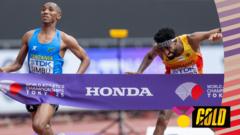Can Simbu's Nail-Biting 0.03-Second Marathon Win Be Beaten?

Published: 2025-09-15 08:25:24 | Category: sport
The men's marathon at the World Athletics Championships in Tokyo saw a breathtaking finish, with Tanzania's Alphonce Felix Simbu clinching gold in a dramatic sprint against Germany's Amanal Petros. Simbu secured victory by a mere three hundredths of a second, showcasing the intensity and competitiveness of elite marathon racing.
Last updated: 25 October 2023 (BST)
Key Takeaways from the Dramatic Finish
- Alphonce Felix Simbu won the marathon gold medal by just 0.03 seconds.
- Amanal Petros finished a close second, highlighting the race's competitiveness.
- The event took place during the World Athletics Championships in Tokyo.
- This finish underscores the thrilling nature of marathon racing.
- The performance reflects the athletes' rigorous training and dedication.
The Race Overview
The men's marathon at the World Athletics Championships is a significant event in the athletics calendar, drawing top competitors from around the globe. This year, the race unfolded under the bright lights of Tokyo, a city known for its vibrant culture and enthusiastic sports fans. The marathon distance of 42.195 kilometres is a true test of endurance, requiring not just physical strength but also mental fortitude.
Setting the Scene in Tokyo
Tokyo, having hosted the Summer Olympics just a year prior, provided an ideal backdrop for this high-stakes marathon. The city's urban landscape, combined with its commitment to athletics, created an electrifying atmosphere. Competitors faced a challenging course, which included various terrains and weather conditions, further intensifying the competition.
The Final Stretch: A Nail-Biting Conclusion
As the marathon approached its conclusion, spectators were treated to an exhilarating showdown. With only metres remaining, the two frontrunners, Simbu and Petros, were neck and neck. The tension was palpable as they pushed their limits, each striving for victory. In the final sprint, Simbu's determination and speed allowed him to inch ahead, claiming gold in a remarkable finish.
What Makes Marathon Racing Special?
Marathon racing stands out in the athletics world for several reasons. First, it embodies the spirit of perseverance, as athletes train for months, if not years, to prepare for such a demanding event. Second, the marathon is not just a test of physical ability; it requires strategic thinking, as runners must manage their energy throughout the race. Finally, the camaraderie among marathon runners—whether competing or cheering from the sidelines—adds a unique element to the experience.
Marathon Training: The Athlete's Journey
To compete at such a high level, marathon runners engage in rigorous training regimes. These often include:
- Long-distance runs to build stamina.
- Speed workouts to enhance pace.
- Strength training to prevent injuries.
- Recovery days to allow the body to heal and adapt.
Such training not only prepares athletes for the physical challenges of a marathon but also helps them develop mental resilience, crucial for pushing through fatigue during the race.
The Significance of This Race
This particular marathon at the World Athletics Championships is significant for various reasons. Firstly, it highlights the growing competitiveness within the sport, as emerging athletes like Simbu and Petros challenge established norms. Secondly, the close finish serves as a reminder of the unpredictability of marathon racing, where fortunes can change in an instant.
Historical Context of Marathon Racing
The marathon has a rich history, dating back to the ancient Greeks. The contemporary marathon, popularised by events such as the Boston Marathon, has become a staple in athletics. Over the years, records have been broken, and new talents have emerged, making each race a story of its own.
Looking Ahead: The Future of Marathon Racing
As the sport continues to evolve, future marathons are likely to see even more thrilling finishes and remarkable performances. With advancements in training techniques, nutrition, and technology, athletes are better equipped than ever to push the boundaries of what is possible in marathon racing. The excitement generated by events like the World Athletics Championships fuels interest in the sport and inspires future generations of runners.
FAQs
Who won the gold medal in the men's marathon at the World Athletics Championships in Tokyo?
Alphonce Felix Simbu of Tanzania won the gold medal by finishing just 0.03 seconds ahead of Germany's Amanal Petros.
What was the atmosphere like during the marathon in Tokyo?
The atmosphere in Tokyo was electric, with enthusiastic spectators and a vibrant city backdrop, enhancing the excitement of the race.
How long is a marathon?
A marathon is 42.195 kilometres long, which is approximately 26.2 miles.
What do marathon runners focus on during their training?
Marathon runners focus on building stamina, improving speed, strength training, and ensuring adequate recovery time to prepare for the race.
Why is the marathon significant in athletics?
The marathon is significant because it tests both physical endurance and mental resilience, showcasing the dedication and spirit of athletes worldwide.
As we reflect on this incredible race, it is clear that moments like these enrich the sport of athletics and inspire future champions. What do you think the next marathon will bring? #MarathonMagic #AthleticsChampionships #Tokyo2023



